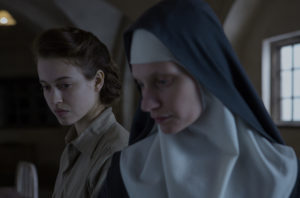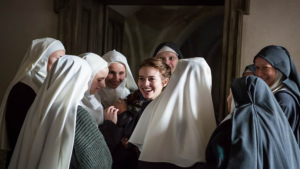 Review: Limited Theatrical Run
Review: Limited Theatrical Run
The Innocents | Anne Fontaine | France | 2016 | 115 minutes
Sundance Cinema Screening Room, Opens Friday, September 9»
The latest drama from Anne Fontaine (Gemma Bovary) is a subtle and moving tribute to women who have harnessed the power of their shared experience to face adversity.
In The Innocents, a young French woman raised by communists and a Polish nun cloistered in a convent understand each other using a kind of shorthand, despite their dramatically different life choices and backgrounds. They can do so because they are women—not because of an inherent quality in all women, but because of their shared experience as women in the aftermath of World War II.
The power of this shared experience, when utilized to help each other, makes The Innocents moving and memorable. Using a story that could have been explosive and exploitive, director Anne Fontaine delivers a quiet tribute to that power and to the women who have harnessed it.
In post-war Poland, a young nun escapes her convent to seek medical assistance in the nearest town. Young orphans lead her to Mathilde (Lou de Laâge), a medical student with the French Red Cross who tells her she can’t help her, and advises her to approach the Polish Red Cross instead. Hours later Mathilde notices the nun praying outside of her window, so she decides to investigate. At the convent she discovers a particularly complex and devastating example of sexual violence during wartime.
A young woman has gone into labor, and Mathilde must intervene immediately due to a breech birth. The Mother Superior (Agata Kulesza) first tells Mathilde that the woman was taken in after her family rejected her for the pregnancy out of wedlock. But soon Mathilde discovers that the young mother was already a member of the convent. She and several of her sisters had been raped by Russian soldiers in the late phases of the war. Six are still pregnant, and they will need Mathilde’s medical assistance.
Mathilde and the nuns are caught up in a nexus of institutional and ideological conflicts and contradictions. Mother Superior prioritizes keeping the pregnancies and births a secret because they threaten the convent itself and she knows how much harsher the world will be for the young nuns outside of its walls.
Mathilde has been sent to Poland to help people, but technically she is not supposed to utilize her resources to help the nuns, or even travel to their sector. As a young modern professional, and sexually active (with her Red Cross supervisor), Mathilde wonders why some of the women choose to remain in the convent.
 Mathilde’s best ally is Sister Maria (Agata Buzek), who is unusually frank, more open, and more worldly than many of her colleagues. Unlike many of the others, Sister Maria had sexual experiences before entering the convent, thus she remains far more comfortable with her own body and her sexuality. Several of the sisters resist any physical contact during Mathilde’s examinations, and Sister Maria must assure them that they are not committing a sin by allowing her to touch them.
Mathilde’s best ally is Sister Maria (Agata Buzek), who is unusually frank, more open, and more worldly than many of her colleagues. Unlike many of the others, Sister Maria had sexual experiences before entering the convent, thus she remains far more comfortable with her own body and her sexuality. Several of the sisters resist any physical contact during Mathilde’s examinations, and Sister Maria must assure them that they are not committing a sin by allowing her to touch them.
Mathilde and Maria’s relationship exemplifies why The Innocents works so well. They discuss their lives and their life decisions with great insight about the advantages and disadvantages inside and outside the convent walls. Maria, knowing the outside world well, states that despite the war and the recent trauma, she is happy with convent life. Mathilde, who has most of the advantages of a modern professional woman, is not sure if she can say the same. Neither de Laâge nor Buzek go for cheap emotional pandering with the material that could easily turn too melodramatic; both provide their characters with a delicate balance of confidence and vulnerability.
The institutions in which these women navigate their lives are presented not in black and white but in shades of grey. When Mathilde is also sexually assaulted by Russian soldiers, she finds comfort and solace in the convent and its rituals despite her lack of faith. But Mother Superior is capable of unacceptable means to protect the solitude and relative safety of the convent.
Fontaine’s restrained visual style allows the drama to emerge from the women as they slowly learn to trust each other. But the images slowly begin to reveal their own beauty, with subtle touches like very shallow depth of field (see top image) when you’re expecting more standardized coverage of the action.
The script provides a structural climax at the end, but the emotional climax comes earlier when the nuns overwhelm Mathilde with their gratitude for helping prevent another intrusion from Russian soldiers (see picture above). The physical transformation for everyone involved is quite striking, as reserved postures and expressions explode into hugs and smiles. At that moment, the women transcend their roles and uniforms and become a true community of women who can draw from what they have overcome to face any new challenges.